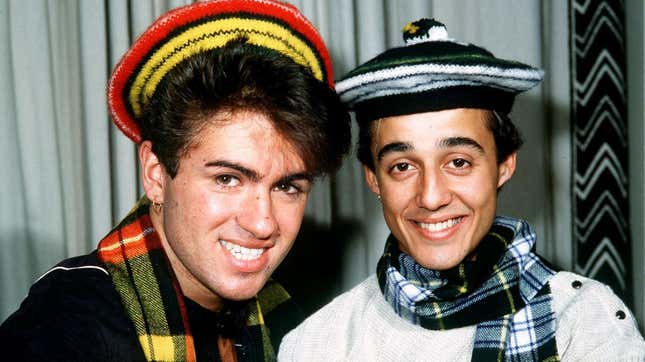New ‘Wham!’ Documentary Is a Wormhole Back to a Goofier, Simpler Era
On Netflix now, this stylish doc pays proper tribute to the duo that made George Michael a star.
EntertainmentMovies

“Everybody at the time was like, how did these two idiots become so bloody massive?” George Michael reflects in a voice over in Wham!, the new Netflix documentary about the relatively short-lived duo that served as a launchpad for his superstardom. Before that, though, Wham! was a pop force in its own right, a proto-boy band duo consisting of Michael and Andrew Ridgeley that racked up a stunning string of hits in its relatively short lifespan—their first single, “Wham Rap! (Enjoy What You Do?),” was released in June 1982, and their farewell show at London’s Wembley Stadium took place some four years later, on June 28, 1986.
Wham!, directed by Chris Smith (Fyre, Operation Varsity Blues), hurtles through that four-year frame at a giddy clip, tracing the duo’s early days of showing up at record companies, demo in hand, trying to sell themselves to unconvinced execs, to their very public goodbye in front of a crowd of 72,000 spectators. Those who followed the story or paid attention to the deluge of retrospective media in the wake of Michael’s 2016 death—the documentary Freedom, James Gavin’s excellent and exhaustive 2022 biography George Michael: A Life, Ridgeley’s 2019 memoir Wham!, George Michael and Me—will find little new information in this breezy, 92-minute doc. Though its promo copy does tout “remarkable and never-before-seen footage,” the main story points have been accessible for a while now. Wham!’s failure to break news is not a big problem, though, given the high gloss packaging. It’s a fitting tribute to a group that prized style—at least as much as substance.
-

-

-

-

-

-

-

-

-

-

-

-

-

-

-

-

-

-

-

-

-

-

-

-

-

-

-

-

-

-

-

-

-

-

-

-

-

-

-

-








































